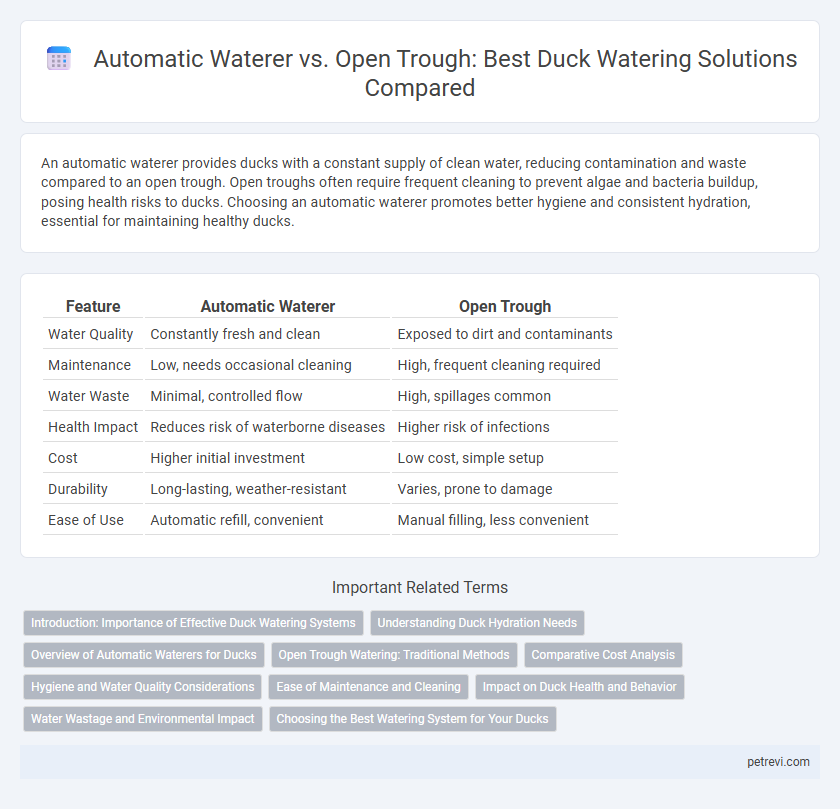An automatic waterer provides ducks with a constant supply of clean water, reducing contamination and waste compared to an open trough. Open troughs often require frequent cleaning to prevent algae and bacteria buildup, posing health risks to ducks. Choosing an automatic waterer promotes better hygiene and consistent hydration, essential for maintaining healthy ducks.
Table of Comparison
| Feature | Automatic Waterer | Open Trough |
|---|---|---|
| Water Quality | Constantly fresh and clean | Exposed to dirt and contaminants |
| Maintenance | Low, needs occasional cleaning | High, frequent cleaning required |
| Water Waste | Minimal, controlled flow | High, spillages common |
| Health Impact | Reduces risk of waterborne diseases | Higher risk of infections |
| Cost | Higher initial investment | Low cost, simple setup |
| Durability | Long-lasting, weather-resistant | Varies, prone to damage |
| Ease of Use | Automatic refill, convenient | Manual filling, less convenient |
Introduction: Importance of Effective Duck Watering Systems
Effective duck watering systems are crucial for maintaining optimal hydration and promoting healthy growth in duck populations. Automatic waterers provide consistent, clean water supply, minimizing contamination risks and reducing labor compared to open troughs. Open troughs, while simple and inexpensive, often require frequent cleaning and can lead to water spillage and bacterial buildup, impacting duck health.
Understanding Duck Hydration Needs
Automatic waterers provide a consistent and clean water supply, reducing contamination risks that can lead to disease in ducks. Open troughs allow ducks to engage in natural foraging behaviors but require frequent maintenance to keep water fresh and free of debris. Understanding duck hydration needs involves balancing accessibility with hygiene to promote optimal health and growth.
Overview of Automatic Waterers for Ducks
Automatic waterers for ducks provide a consistent and clean water supply, reducing contamination risks common with open troughs. These systems often feature float valves that maintain water levels automatically, minimizing maintenance and water waste. Their design supports ducks' natural drinking behaviors while enhancing overall flock health and hygiene.
Open Trough Watering: Traditional Methods
Open trough watering for ducks involves using a shallow, open container that allows ducks to easily access and submerge their bills, which supports natural feeding and cleaning behaviors. This traditional method requires regular cleaning to prevent algae growth and water contamination, ensuring optimal duck health and reducing disease risks. Despite the maintenance demands, open troughs provide a cost-effective and simple hydration solution that mimics natural water sources.
Comparative Cost Analysis
Automatic waterers generally have higher upfront costs ranging from $50 to $200, but lower maintenance expenses and reduced water waste compared to open troughs, which are cheaper initially at $10 to $30 but require frequent cleaning and water replacement. The efficiency of automatic waterers in conserving water and minimizing contamination can lead to cost savings over time, despite the initial investment. Open troughs, while cost-effective for small flocks or short-term use, often incur higher ongoing expenses due to water spillage and increased labor for sanitation.
Hygiene and Water Quality Considerations
Automatic waterers provide a hygienic advantage over open troughs by minimizing water contamination from dirt, feces, and algae, which helps maintain better water quality for ducks. Their closed systems reduce the risk of bacterial growth and improve overall health by ensuring a constant supply of clean water. Open troughs, while simpler, require frequent cleaning to prevent the buildup of harmful microorganisms that can lead to duck diseases.
Ease of Maintenance and Cleaning
Automatic waterers reduce the need for frequent cleaning by minimizing water contamination and spillage, making them easier to maintain compared to open troughs. Open troughs require daily manual cleaning to prevent algae buildup and bacterial growth that can harm duck health. The design of automatic waterers often includes features like drip trays and enclosed reservoirs, which streamline sanitation and ensure cleaner, fresher water for ducks.
Impact on Duck Health and Behavior
Automatic waterers provide clean, fresh water continuously, reducing the risk of contamination and waterborne diseases common with open troughs. Ducks using automatic waterers exhibit less aggressive behavior due to consistent water availability, while open troughs can promote competition and stress from limited access. Proper hydration through automatic waterers supports better feather condition, overall health, and natural dabbling behavior in ducks.
Water Wastage and Environmental Impact
Automatic waterers significantly reduce water wastage compared to open troughs by delivering a controlled flow that minimizes spillage and contamination, promoting cleaner water supply for ducks. Open troughs often lead to higher water loss through evaporation and splashing, increasing environmental impact due to runoff and potential breeding grounds for mosquitoes. Efficient water use with automatic systems supports sustainability and lowers the ecological footprint of duck farming operations.
Choosing the Best Watering System for Your Ducks
Automatic waterers provide a clean, continuous water supply that minimizes contamination and reduces maintenance compared to open troughs. Open troughs allow ducks to engage in natural behaviors but require frequent cleaning to prevent algae growth and waterborne diseases. Selecting the best watering system depends on factors like flock size, maintenance capacity, and the importance of natural duck behaviors in your setup.
Automatic Waterer vs Open Trough for Duck watering Infographic

 petrevi.com
petrevi.com